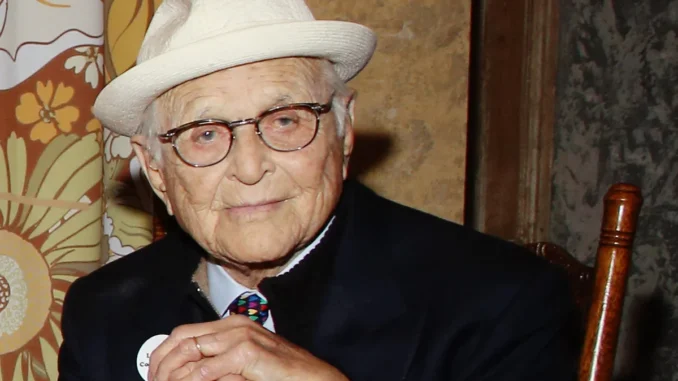
Known for boundary-pushing series like “All in the Family,” “Maude” and “The Jeffersons,” the producer moved the needle while setting the bar for the American sitcom
Baseball had Babe Ruth. Rock ‘n’ roll had The Beatles. Television had Norman Lear.
The legendary writer and producer died at age 101 one week ago — Tuesday, Dec. 5 — and left behind a legacy cementing him as one of TV’s most influential figures and the forefather of the American sitcom, especially as it relates to tackling politics and hot-button issues on broadcast television.
Inducted nearly 40 years ago as part of the Television Academy Hall of Fame’s first-ever class, Lear’s storied career saw him produce, write, create or develop over 100 shows, including “All in the Family,” “Maude” and “The Jeffersons.” His work on the small screen championed free speech and moved the needle for onscreen representation through a call sheet of timeless comedic characters.
Writing for TV always seemed like a good fit for Lear. It provided the scrappy progressive ample space to jot down ideas and build out what would become landmark plot lines for many of his most beloved characters.
After stints writing comedy sketches for Dean Martin and Jerry Lewis, Lear went on to create series of his own, like the short-lived western “The Deputy” (1959-1961), which he cocreated with Roland Kibbee and starred Henry Fonda. By the time the 1970s rolled around, Lear had hit his stride. “All in the Family,” a sitcom that launched political discourse through its lovable curmudgeon, Archie Bunker (Carroll O’Connor), premiered in 1971 and ran for over 200 episodes in nine seasons.
To say that a character like the working-class Archie was monumental to TV audiences is the understatement of a century. “All in the Family” broke new ground for its depiction of real-life issues of the day that weren’t usually shown on TV, including religion, cancer, women’s rights, antisemitism and racism. Lear developed the show to reflect Archie’s conservative values clashing with his liberal daughter Gloria (Sally Struthers) and prickly son-in-law Mike (Rob Reiner).
Lear fought hard to push the envelope on “All in the Family,” often introducing new characters to the CBS sitcom that challenged Archie’s perception of American life and livelihood. In one such instance, during the show’s first season, an episode titled “Judging Books by Covers” saw Archie criticizing one of Mike’s friends, a person he mistakenly believed was gay.
It is later revealed in the episode that Archie’s football-loving, traditionally masculine and perpetually single friend Steve (Philip Carey) is actually the gay one. Challenging all preconceived stereotypes of homosexuality at a time when the Gay Rights Movement was still a hot-button issue and pride parades were just coming into existence around the country, Lear crafted a funny and contentious moment for Archie to realize his assumptions and confront the changes of 1971 society. Steve was the first openly gay character depicted on TV.
Equally crucial to a very different degree is the “All in the Family” spin-off, “Maude,” the series that flung the legendary Bea Arthur into the zeitgeist. Starring in her own show after appearing in “All in the Family” as the liberal cousin of Archie’s wife Edith (Jean Stapleton), Arthur embodied a ferocious spirit as the titular Maude Findlay, an outspoken middle-aged woman living in New York. Viewed as the polar opposite of Archie in political and societal acumen, Maude was firm in her convictions, which often got her in trouble with others through her overbearing personality.
In its first season, “Maude” hit the ground running and refused to shy from divisive issues of the day, including abortion. The episode “Maude’s Dilemma” showed 47-year-old Maude learning that she was pregnant and needing to make the difficult decision to either keep it or have an abortion. Her husband, Walter (Bill Macy), was supportive of whatever Maude decided to do. The plot also saw him being persuaded into having a vasectomy.
“Maude’s Dilemma” might have been written by Austin Kalish, Irma Kalish and Susan Harris, but the plot had Lear’s influence all over it. When he created the series to reflect real-life issues concerning women of the day, he consciously decided not to show Maude having a miscarriage, as this was a previous storyline on “All in the Family.” Instead, Lear wanted to realistically characterize a difficult situation where a middle-aged woman would have to determine what was right for her own body. Morality and confusion would collide in Maude’s mind, giving way to one of TV’s first depictions of abortion.
Through to today, issues facing the LGBTQ+ community and women’s autonomy are daily topics across the political spectrum and have become typical plot lines on American sitcoms, TV dramas and beyond. Olivia Pope found herself choosing to have an abortion on “Scandal,” while cable TV shows like “Queer as Folk” and “The L Word” have tackled modern gay life. NBC sitcom “Will & Grace” is widely regarded for further breaking ground in queer representation — and even changing Americans’ popular views on same-sex marriage.
But none of these instances would likely exist without Lear. The years after “Maude” saw the writer and producer leading the charge in the 1970s and 1980s with innovative and norm-disrupting shows like “The Jeffersons,” “Sanford and Son,” “One Day at a Time” and “Good Times.” Each series differed from the one before it, and Lear’s commentary on American life and politics shined through.
It was ultimately with his staunch defense of free speech and fearless progressive convictions that Lear shaped the American sitcom — and society — for decades to come. And it’s how he became the national treasure we remember him as today.